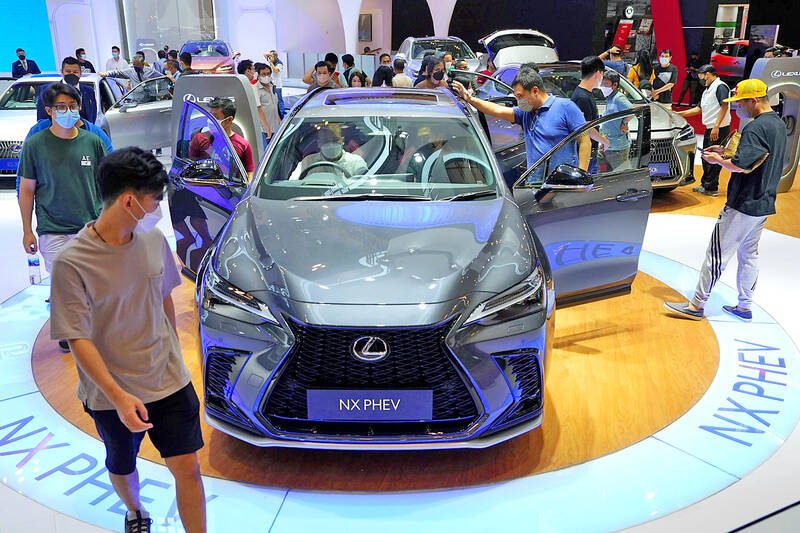Toyota Motor Corp is investing ¥730 billion (US$5.26 billion) in Japan and the US to boost production of batteries for electric vehicles (EV), the Japanese automaker said yesterday.
Production is set to start between 2024 and 2026. In Japan, ¥400 billion would go into the Himeji plant of Prime Planet Energy & Solutions Co, as well as in Toyota factories and property. In the US, about ¥325 billion would be invested in Toyota Battery Manufacturing in North Carolina, the company said.
Toyota has scored success with the Prius and other hybrid models, which have an engine as well as a battery-driven electric motor, and so the company has at times been seen as a laggard on electric vehicles.

Photo: Bloomberg
However, the global demand for electric vehicles is expected to grow in coming years as fuel prices rise and concerns grow about the environment.
Earlier this week, Japanese rival Honda Motor Co announced with major South Korean battery maker LG Energy Solution Ltd that they were investing US$4.4 billion in a joint venture in the US to produce batteries for Honda electric vehicles in the North American market, with mass production of advanced lithium-ion battery cells to start by the end of 2025.
Toyota reiterated its position that “there is more than one option for achieving carbon neutrality,” highlighting how its efforts with hybrids and fuel cells run on hydrogen can also be solutions. The options may depend on where a customer lives, it said.
“This investment is aimed at enabling Toyota to flexibly meet the needs of its various customers in all countries and regions by offering multiple powertrains and providing as many options as possible,” Toyota said in a statement.
Other automakers, including Ford Motor Co, General Motors Co, Hyundai Motor Co and its affiliate Kia Motors Corp, Stellantis NV and VinFast have announced plans for US battery plants.
A new US law offers an incentive to build batteries in North America, including a tax credit of up to US$7,500 that could be used to defray the cost of buying an electric vehicle. To qualify for the full credit, the electric vehicle must contain a battery built in North America with 40 percent of the metals mined or recycled on the continent.

Vincent Wei led fellow Singaporean farmers around an empty Malaysian plot, laying out plans for a greenhouse and rows of leafy vegetables. What he pitched was not just space for crops, but a lifeline for growers struggling to make ends meet in a city-state with high prices and little vacant land. The future agriculture hub is part of a joint special economic zone launched last year by the two neighbors, expected to cost US$123 million and produce 10,000 tonnes of fresh produce annually. It is attracting Singaporean farmers with promises of cheaper land, labor and energy just over the border.

US actor Matthew McConaughey has filed recordings of his image and voice with US patent authorities to protect them from unauthorized usage by artificial intelligence (AI) platforms, a representative said earlier this week. Several video clips and audio recordings were registered by the commercial arm of the Just Keep Livin’ Foundation, a non-profit created by the Oscar-winning actor and his wife, Camila, according to the US Patent and Trademark Office database. Many artists are increasingly concerned about the uncontrolled use of their image via generative AI since the rollout of ChatGPT and other AI-powered tools. Several US states have adopted

KEEPING UP: The acquisition of a cleanroom in Taiwan would enable Micron to increase production in a market where demand continues to outpace supply, a Micron official said Micron Technology Inc has signed a letter of intent to buy a fabrication site in Taiwan from Powerchip Semiconductor Manufacturing Corp (力積電) for US$1.8 billion to expand its production of memory chips. Micron would take control of the P5 site in Miaoli County’s Tongluo Township (銅鑼) and plans to ramp up DRAM production in phases after the transaction closes in the second quarter, the company said in a statement on Saturday. The acquisition includes an existing 12 inch fab cleanroom of 27,871m2 and would further position Micron to address growing global demand for memory solutions, the company said. Micron expects the transaction to

A proposed billionaires’ tax in California has ignited a political uproar in Silicon Valley, with tech titans threatening to leave the state while California Governor Gavin Newsom of the Democratic Party maneuvers to defeat a levy that he fears would lead to an exodus of wealth. A technology mecca, California has more billionaires than any other US state — a few hundred, by some estimates. About half its personal income tax revenue, a financial backbone in the nearly US$350 billion budget, comes from the top 1 percent of earners. A large healthcare union is attempting to place a proposal before